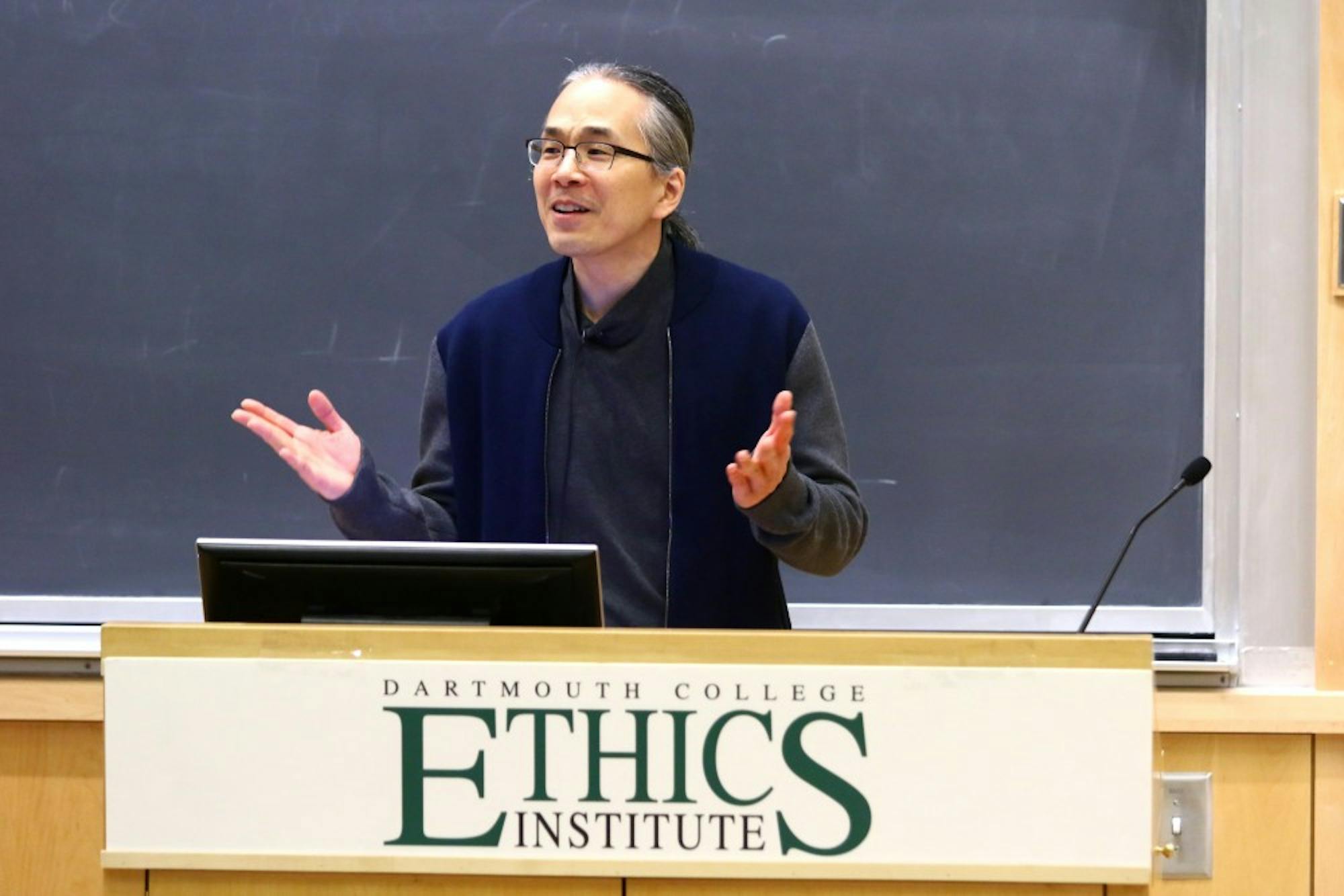The Ethics Institute of Dartmouth hosted author Ted Chiang for a talk entitled “Technology and the Narrative of the Self” on Tuesday as part of the Dorsett Fellowship Lecture Series, which seeks to bring “practitioners and scholars of ethics” to campus, according to government professor Sonu Bedi, director of the Ethics Institute.
“We have brought philosophers, lawyers and politicians here as part of the Dorsett Fellowship in years past,” Bedi said. “But I had read some of Chiang’s work and found he had an interesting way of thinking about ethical issues. When you’re a writer, your approach tends to be more capacious and humanist, so that’s why I wanted him to come.”
Chiang’s talk explored the concept of “life-logging,” a hypothetical technology that would video record every waking moment of people’s lives and then provide a search engine, akin to Google, that would allow them to review specific memories. Chiang considered the various effects this yet theoretical technology could have on individuals and society at large; would native memories wither with disuse? Would people become better and more responsible having all of their interactions available like court testimonies? Moreover, he asked questions of the role subjective memory has on shaping human beings. One event can be remembered entirely differently by two people. How much does it matter who is right?
Chiang’s lecture provoked many thoughts from the audience. One audience member wondered if social media would not soon dominate people’s lives in much the same way, if it was not doing so already. Another speculated if history could even exist without a degree of selectivity about the events that occurred. Government professor Michelle Clarke contemplated whether “life-logging” would destroy education by eliminating the “freedom to fail” that imperfect human memory permits.
“It’s a talk we need because this is a real phenomenon,” Clarke said. “Our lives are recorded more and more, which I believe already has a big impact on how we speak and act.”
One student, however, had a more optimistic outlook about the effects this technology could have on society.
“It made me feel hopeful, as there can be more accountability,” Sarah Hong ’21 said. “Having videos of events that happen promotes discussion and transparency.”
Chiang presented his ideas about “life-logging” in another format, a short story called “The Truth of Fact, The Truth of Feeling,” which juxtaposes two different narratives about the introduction of new technologies. The first, from the future, is about a man whose strained relationship with his daughter is indelibly altered by life-logging. The second, from the past, is about a boy from Tivland in West Africa whose values are challenged when he is taught how to write by a European missionary. Chiang’s work reminds readers that technology is not only robots and computers, it is every advancement resulting from the application of knowledge that humans have made since the origin of man.
“Whenever you think about the impact that science and technology have on our lives, you don’t have to go very far before you start running into philosophical questions,” Chiang said in an interview with The Dartmouth. “Technology is a fundamental part of who we are. The history of technology is the history of civilization.”
Technology can both solve problems and create them. It is this balance between the positives and negatives that Chiang urges his readers to examine before labeling any new development as progress.
“If someone says a new technology is necessary or that it solves a lot of problems, you need to ask exactly whose problems are being solved here,” Chiang said.
Chiang, as a celebrated science fiction author, uses his writing as a vehicle to ask such questions through its mirroring of the world.
“Science fiction is about what the world would look like given the widespread adoption of a new speculative invention,” he said. “A common approach for science fiction writers is to ask who is unhappy in this world, because no matter what, there is always someone who is unhappy.”
Chiang’s lecture, like his writing, emphasized the great unknown. Hypothetical situations cannot be given definitive answers and Chiang is reluctant to assume the role of a prophet. However, Chiang’s work emphasizes the importance of posing these questions, as they are the only way people can hope to prepare for the future as well as critically examine their present.




